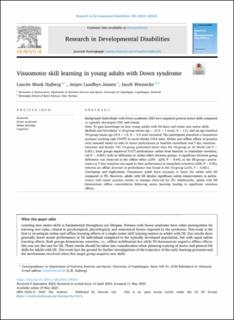| dc.contributor.author | Højberg, Laurits Munk | |
| dc.contributor.author | Lundbye-Jensen, Jesper | |
| dc.contributor.author | Wienecke, Jacob | |
| dc.date.accessioned | 2023-10-23T13:28:45Z | |
| dc.date.available | 2023-10-23T13:28:45Z | |
| dc.date.created | 2023-06-03T13:47:31Z | |
| dc.date.issued | 2023 | |
| dc.identifier.citation | Research in Developmental Disabilities. 2023, 138(Juli 2023), Artikkel 104535. | en_US |
| dc.identifier.issn | 0891-4222 | |
| dc.identifier.uri | https://hdl.handle.net/11250/3098175 | |
| dc.description | This is an open access article under the CC BY license (http://creativecommons.org/licenses/by/4.0/). | en_US |
| dc.description.abstract | Background: Individuals with Down syndrome (DS) have impaired general motor skills compared to typically developed (TD) individuals.
Aims: To gain knowledge on how young adults with DS learn and retain new motor skills.
Methods and Procedures: A DS-group (mean age = 23.9 ± 3 years, N = 11), and an age-matched TD-group (mean age 22.8 ± 1.8, N = 14) were recruited. The participants practiced a visuomotor accuracy tracking task (VATT) in seven blocks (10.6 min). Online and offline effects of practice were assessed based on tests of motor performance at baseline immediate and 7-day retention.
Outcomes and Results: The TD-group performed better than the DS-group on all blocks (all P < 0.001). Both groups improved VATT-performance online from baseline to immediate retention, (all P < 0.001) with no difference in online effect between groups. A significant between-group difference was observed in the offline effect (∆TD - ∆DS, P = 0.04), as the DS-group’s performance at 7-day retention was equal to their performance at immediate retention (∆DS, P > 0.05), whereas an offline decrease in performance was found in the TD-group (∆TD, P < 0.001).
Conclusions and Implications: Visuomotor pinch force accuracy is lower for adults with DS compared to TD. However, adults with DS display significant online improvements in performance with motor practice similar to changes observed for TD. Additionally, adults with DS demonstrate offline consolidation following motor learning leading to significant retention effects. | en_US |
| dc.language.iso | eng | en_US |
| dc.subject | cognition | en_US |
| dc.subject | Down syndrome | en_US |
| dc.subject | motor learning | en_US |
| dc.title | Visuomotor skill learning in young adults with Down syndrome | en_US |
| dc.type | Peer reviewed | en_US |
| dc.type | Journal article | en_US |
| dc.description.version | publishedVersion | en_US |
| dc.rights.holder | © 2023 The Authors | en_US |
| dc.source.pagenumber | 14 | en_US |
| dc.source.volume | 138 | en_US |
| dc.source.journal | Research in Developmental Disabilities | en_US |
| dc.identifier.doi | 10.1016/j.ridd.2023.104535 | |
| dc.identifier.cristin | 2151502 | |
| dc.description.localcode | Institutt for idrett og samfunnsvitenskap / Department of Sport and Social Sciences | en_US |
| dc.source.articlenumber | 104535 | en_US |
| cristin.ispublished | true | |
| cristin.fulltext | original | |
| cristin.qualitycode | 1 | |
